

Anarchy saves lives photo. Dark They were, And Golden Eyed (The Naming of Names) - Рэй Брэдбери (Бредбери) - скачать рассказ. The rocket's metal cooled in the meadow winds.
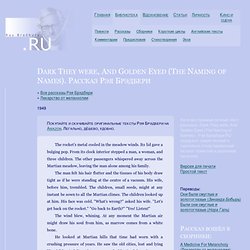
Its lid gave a bulging pop. The ‘How Are You?’ Culture Clash. 10-wedding-traditions-with-surprising-origins. So as you put down a $5,000 deposit here and a $3,000 deposit there, you feel reassured that these big checks are linking you to tradition.

Throughout history, the families of brides have shelled out enormous sums of money to put on good parties. Right? Well, no. That's not entirely right. While the aristocratic families in some cultures have always put on expensive weddings to show their place in society, the traditional American wedding was more like a barn raising. In fact, among frontier families, the lack of access to a preacher led to the acknowledgement -- and legalization -- of common-law marriages, where a couple who moves in together receives all the rights and privileges of marriage. In more established communities, the bride's female family members and friends would hold special quilting circles to embroider and create her trousseau. Then the society families started collecting gifts. So you had to have the invitations. Nesia : News - July - the season for Balinese tooth filing ceremonies. July - the season for Balinese tooth filing ceremonies DENPASAR (indo.com): Throughout the months of July and August it is common to find tooth-filing ceremonies throughout Bali.
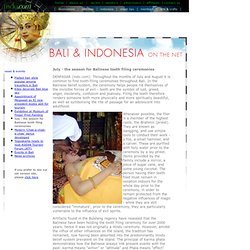
Your Family's Funeral Traditions. Singlish Guide. Singapore Vacation Travel Essentials - Visa, Customs, Tax Refunds & More While it may not be recognised in the world as a formal language, a bit of knowledge on Singlish is definitely essential when travelling around Singapore.

It is a unique blend of English, Chinese, Malay, Tamil and local dialects. To some, it is a beautiful language that proudly displays the multi-cultural character of our society; to others, it is a colloquialism so full of grammatical errors that it makes you squirm each time you hear it. Regardless, it is useful to understand a fair bit of Singlish, or at least understand the most common phrases used to avoid getting ‘lost in translation’. Besides the typical “lah” which punctuates most sentences used by the locals, here is a quick guide of phrases that you may encounter and use most often: Don’t pray pray ah!
Oh, izzit? Dohwan: “No, thanks.” / “I don’t want it.” Kiasu: A general term used to describe the highly competitive nature of many Singaporeans. So how? Alamak! Rabbit-Proof Fence (film) Rabbit-Proof Fence is a 2002 Australian drama film directed by Phillip Noyce based on the book Follow the Rabbit-Proof Fence by Doris Pilkington Garimara.
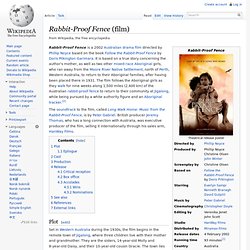
It is based on a true story concerning the author's mother, as well as two other mixed-race Aboriginal girls, who ran away from the Moore River Native Settlement, north of Perth, Western Australia, to return to their Aboriginal families, after having been placed there in 1931. The film follows the Aboriginal girls as they walk for nine weeks along 1,500 miles (2,400 km) of the Australian rabbit-proof fence to return to their community at Jigalong, while being pursued by a white authority figure and an Aboriginal tracker.[2]
Jamaican patois Bible released – Di Gud Nyuuz bout Jiizas. KINGSTON, Jamaica, Wednesday December 12, 2012 – After years of meticulous translation from the original Greek, the Bible Society in Jamaica is releasing print and audio CD versions of the first patois translation of the New Testament, or “Di Jamiekan Nyuu Testiment.”
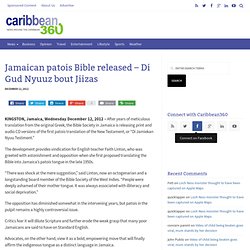
The development provides vindication for English teacher Faith Linton, who was greeted with astonishment and opposition when she first proposed translating the Bible into Jamaica’s patois tongue in the late 1950s. “There was shock at the mere suggestion,” said Linton, now an octogenarian and a longstanding board member of the Bible Society of the West Indies. “People were deeply ashamed of their mother tongue. It was always associated with illiteracy and social deprivation.” Oakland Ebonics controversy. For students whose primary dialect was "Ebonics", the Oakland resolution mandated some instruction in that dialect, both for "maintaining the legitimacy and richness of such language... and to facilitate their acquisition and mastery of English language skills.
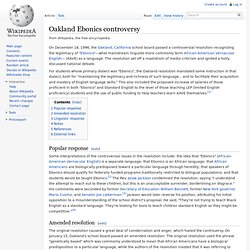
" This also included the proposed increase of salaries of those proficient in both "Ebonics" and Standard English to the level of those teaching LEP (limited English proficiency) students and the use of public funding to help teachers learn AAVE themselves.[1] Popular response[edit] Amended resolution[edit] Linguists' response[edit] Some linguists and associated organizations issued statements in support of recognizing the legitimacy of African-American Vernacular English as a language system. "The systematic and expressive nature of the grammar and pronunciation patterns of the African-American vernacular has been established by numerous scientific studies over the past thirty years. Notes[edit] References[edit] External links[edit]
Official Site of the Navajo Code Talkers.